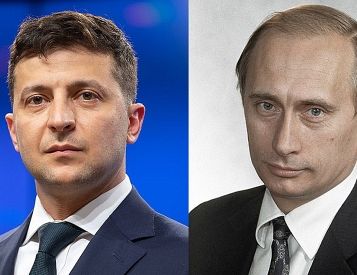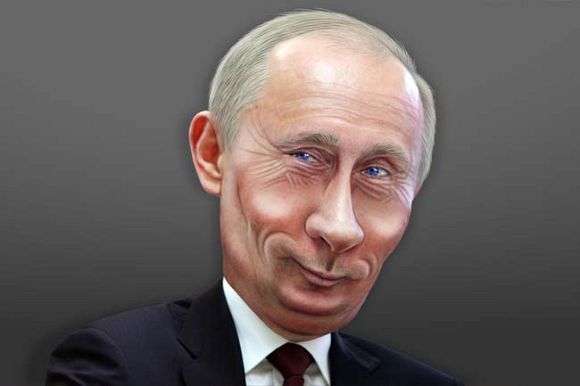The first anniversary has passed. Is anyone asking: "what has Russia achieved?"
The country is a pariah; its best and fairest are gaoled, dead or exiled; the economy is on the skids; thousands of its soldier-citizens are dead; Putin is increasingly regarded as a war criminal; Russia is now junior to China and NATO has expanded.
If Russia wins, what form will it take? Toppling the current regime in Kyiv (murdering Volodymyr Zelenskyy, routing Ukrainian troops, occupying the entire country, installing a puppet government) will mean a Kremlin-controlled Ukraine, making Europe a different place. At worst, it will transform Ukraine into a failed state.
U.S. primacy will be seriously dented and security in Europe weakened. NATO may hold back a Russian tide westward but Russia can threaten Moldova and "colonise" Belarus without crossing that line. If NATO support cannot ensure a Ukrainian victory, it will have much less influence. Poland, Finland and the Baltic states are fearful.
China’s position will be immeasurably strengthened. Western sanctions will be largely ineffective and those complying now might drift away.
No matter how devastating the victory, it is unlikely the Ukrainians will be quiescent. Russian terror tactics may keep citizens controlled but, resistance will continue. There will be further mass evacuation of Ukrainians, increasing the displacement already apparent.
Russian victory would lead to further extensive violence.
Human rights abuses perpetrated without sanctions will be repeated, as Ukrainians know, from their history at the hands of their Russian 'brothers'. If the world has done nothing to stop these exterminations, once Russia is ascendant, it will have a free hand. Vladimir Putin’s aim is genocide.
Russian victory will rattle the entities in and immediately outside Russia. Georgia and Kazakhstan fear they may be next.
If Russia loses it will be because of Putin’s miscalculations which are now clear for all to see (except cocooned and denialist Russians). Russian corruption and incompetence and Ukraine’s response mean a Ukrainian victory is not a pipe dream. Currently, nothing short of ejecting Russians from all Ukrainian territory including Crimea can be considered a victory. Even then the longer-term situation would be highly fraught.
Less than complete Ukrainian success would leave the risk of further invasion. While Putin remains, the situation will continue unresolved. He will not give up his imperial dream. If he is "replaced", there is no assurance that his successor or successors won’t re-engage in the war.
Ejecting Russian troops from Ukraine will be difficult. Relevant factors include:
- Hardware: Reports of Russia running out of missiles are unlikely to be conclusive, even if true. Modern western tanks can "best" older Soviet tanks but frontline warfare may favour Ukraine without being "a game changer";
- Troops: Surrendering conscripts describe being pushed into Ukrainian lines, but if they hesitate then their own commanders shoot them. The first mobilization involved huge casualties. Apparently Russian military and Wagner Group are unmoved by the death toll of their own combatants. There is no reason to believe Russia will run out of ‘soldiers’. Ukrainian troops are also suffering high casualties;
- Homegrown revolt: Reports from visitors to Russia’s main cities over Christmas indicate the war is not being felt by Russian civilians. They continue a "don’t know, don’t care" response unless directly affected, and most are not. Sanctions will have some gradual effect. Protestors are in jail or abroad, the one-sided propaganda is increasingly convincing. Putin’s and the war’s approval remain high;
- "Palace coup" against Putin: Fear of Putin and each other among his inner circle acts as a block but must contribute to high volatility. Some must be questioning the benefit to Russia and themselves of continuing. The wider cohort of oligarchs have suffered in differing degrees but many will have ‘exit’ strategies that won’t involve confronting Putin directly.
Victory will require loss of hardware, military capability, citizenry outcry, political instability and economic damage. Russia is a huge country with extensive resources not under threat in this war. A loss may render it down, but not out. The aftermath of the Soviet Union is relevant here.
There is reluctance by Western politicians to contemplate the shattering of Russian power. Appeasers continue to be vocal. They argue not to push Putin into using nukes, not wanting to see a vacuum in Eurasian geopolitics, not allowing China to gain ascendancy and the upheavals that a poor Russian would cause to the world economy.
A Russian failure could trigger a "disintegration" of the Russian Federation, or a civil war and destabilise the countries within the existing Russian orbit. Those fearful of these potential outcomes lay blame on Ukraine, the U.S. and ‘the ’West’. The reluctant warn action should avoid these consequences. This appears to be President Emmanuel Macron’s view.
This belies the reality that fault lies squarely with Russia. Sovereign nations will act in their own interests; separatist groups will grab advantages where they can and republics longing for independence will seize the day.
For a negotiated deal to occur, there will have to be acceptance of partial and fragile gains. If Putin is seriously ill, there is no convincing evidence. While Putin is at the helm, there is no scope for negotiations. His demands have not changed and they allow no room for compromise. The Ukrainian government cannot cede territory for the sake of an uncertain peace.
Ukraine might be forced to accept less than complete victory if support from the West wanes. Providing tanks has reinforced the backing allies are giving. Rumblings suggest some EU members want a deal but so far that has been rejected.
Wars always end. This may be a long war, but not necessarily.
From the beginning, pessimists considered Ukraine lost. Surprise followed when they succeeded in a counter-offensive. Only recently has there been a "stalemate". The Ukrainians have retaken lost territory. They are active in Bakhmut and Luhansk. There was no complete shutdown of fighting by both sides.
A prolonged, grinding war on a line of control that neither side accepts may eventuate. New tanks and other weapons are coming and Ukraine has held Russia off so far.
The anniversary has come and gone. The failure of the mobilization of untrained conscripts to turn the tide; the high casualties of prisoner-soldiers; the tension between the Wagner Group’s leader and the military; and the obvious failure to win, are volatile factors that can change the odds quite quickly. Reports claims Russian armament factories do not have the personnel they need, so prisoners are being recruited there too.
Russia is in a better position to weather a prolonged conflict, if nothing much changes. Ukraine is suffering and the cost of continuing the war will be high.
An unresolved war may humiliate Putin enough that he will need a conclusion.
A long-term war will exacerbate global hunger, for both Ukraine and Russia are food producers. Turkish brokered grain export deals may not last.
African and Middle Eastern countries claim a double standard by the West. 141 countries condemned the invasion at the United Nations, but only 37 have levied sanctions on Russia. This might change either way.
The U.S. and its allies will have to continue providing Ukraine with military support even though politics and resource depletion may render that difficult. Economic sanctions and isolating Moscow diplomatically must continue.
An international court to hear war crimes evidence is being mooted. It will become increasingly difficult for Russia to pretend it is not guilty of a war of aggression.
Evidence is suggesting sanctions are starting to bite.
Ultimately Ukraine has to win. Russia has challenged the fundamental principles of the modern international legal order. For those principles to survive, relevant institutions must act to reaffirm them.
Europe (in differing degrees) is coming to understand that Putin won’t stop. Chechnya, Georgia, Transnistria, Crimea and Donbas in 2014 present a pattern the West has blindly overlooked till now.
"Escalation" is code for the Russian use of nuclear weapons.
The West’s assessment that for all the bluster, Putin will not resort to nuclear options seems valid. Joe Biden has made it clear what the consequences would be if they do go that route. Even if Putin is not sick, he is 70 years old. His supporters must appreciate they will be the ones to suffer the long-term results of nuclear attack
Informal protocols have been keeping the situation in check. Biden won’t allow: a no-fly zone over Ukraine; attacks by Ukraine into Russian territory; NATO troops to join the combat; but the U.S. and its allies will continue to supply more and more military aid.
These "rules" have been clearly communicated to Putin. The Russian position is blurred; Putin has threatened "severe consequences" but done nothing more than pound Ukrainian towns with missiles. "Red lines" are referenced in the media but Russia has not targeted weapons convoys while they are still on NATO land. Russia has committed extreme war crimes against civilians and infrastructure without impediment.
Ukraine has hit select targets inside Russia without "escalation" and neither damaging the bridge nor the warship has triggered nukes. So far, Putin has not used this last device to win his war.
Ukraine, continues to be constrained by Biden’s rules, yet:
“How a nation that has been invaded, subjected to long-range missile strikes, destruction of its cities and the mass rape, torture and murder of its citizens can escalate the war by using weapons similar to its enemy, is one of the great mysteries of this conflict."
Russia could "accidentally" fire nuclear weapons. Ukraine could miscalculate and hit a major civilian target in Russia, but it seems no one wants escalation.
The potential for direct Western participation in the war remains low, but not impossible.
If Russia deploys nuclear weapons, the U.S. or NATO are almost certain to engage. Failure to do so would be too dangerous. Even in the case of a genuine accident or non-deliberate attack by Russia, no one would believe it. NATO would likely deploy a range of conventional weapons to turn the tide of the war very rapidly, rather than nukes.
NATO and the U.S. could not fail to win, given the parlous state of Russia’s military hardware and ill-trained and reluctant fighters. A nuclear attack would alienate those countries that openly or tacitly support Russia, ensuring its complete isolation.
Another trigger could be damage to a Ukrainian nuclear power station. That danger no doubt has exercised the minds of nuclear experts and military personnel since Russia invaded and took control of these facilities.
Right now, there are too many unanswered and unanswerable questions.
Susan Bothmann is the holder of Master of Laws and Master of Fine Arts degrees. She is a Human Rights lawyer and Appeals Tribunals Member (retired) and has a long career in public law practice and Legal Aid.
Related Articles
- China’s peace plan shot down by Western propaganda machine
- The case for diplomacy in Ukraine
- War in Ukraine: Gearing up for end of winter fighting
- Putin claims Ukraine is not a country — history begs to differ
- Ukraine war: Putin takes losses, vows to make a comeback
 This work is licensed under a Creative Commons Attribution-NonCommercial-NoDerivs 3.0 Australia License
This work is licensed under a Creative Commons Attribution-NonCommercial-NoDerivs 3.0 Australia License
Support independent journalism Subscribe to IA.














